Why Women Struggle to Talk About Vaginal Atrophy

We recently worked with Health Awareness on the 2021 Reproductive and Gynaecological Health campaign. A printed publication was enclosed within every copy of The Guardian newspaper. The campaign featured exclusive content from key thought leaders and industry voices raising awareness for reproductive and gynaecological health issues.
We were proud to co-sponsor an article authored by Meg Mathews, Menopause Campaigner and Founder of MegsMenopause. We're please to share this important information with you here:
We know that there is an awareness problem with the menopause in general and that women just don’t realise it is coming. Layered into that, their intrinsic way of putting other people first and you get the perfect storm. Then consider symptoms that are very undesirable to have to go through, no wonder they don’t want to discuss it openly.
Vaginal atrophy is also defined as postmenopausal atrophic vaginitis, it usually begins with the thinning of the walls of the vagina, caused by decreased oestrogen levels. In fact, without oestrogen, vaginal tissue thins, dries out and the tissue becomes less elastic, more fragile, and as a consequence, it can be injured more easily. The vagina can tighten and shrink causing the shortening of the vagina canal.
Impact on Relationships
Women suffering with vaginal atrophy can experience painful sexual intercourse and spotting after sex. This can negatively affect their relationship and enjoyment of intimacy. This in turn can lead to vaginismus, which is where the vagina muscle closes due to stress and makes intercourse impossible. This could be caused by psychological pain from experiencing vaginal atrophy symptoms. They also have a greater chance of chronic vaginal infections and urinary function problems.
"It’s all about being aware of the menopause, understanding the symptoms and then combating that with treatments that work for you."
Variety of Treatments Available
Importantly, there are a variety of treatments available to help combat these symptoms, you don’t have to live with it. One option is HRT (hormone replacement therapy) which will partially restore your (low) hormones, there are also topical oestrogen creams which work in a similar way. Alongside these, vaginal moisturisers which help with dryness and lubricants which help remove friction and pain from intercourse are a great solution.
There are also new treatments such as laser procedures, that gently stimulate collagen production of the tissue within the vaginal wall.
It’s all about being aware of the menopause, understanding the symptoms and then combating that with treatments that work for you.
More Posts
-
Our Story "Behind t...
As Earth Day and Fashion Revolution Day* both take place this week, we'd like to take the opportunity to share more of the story "behinds the seams...
Read More -
Embracing Mindfulne...
Entering (peri) menopause brings with it a host of physical, emotional, and mental changes. From dealing with hot flashes to mood swing...
Read More -
Become Featured on ...
We're thrilled that our Anti-Flush clothing was featured on The Quality Edit in their 'Add To Cart' column is a rundown of our their style edito...
Read More







Comments
0 Comments
Leave a Comment